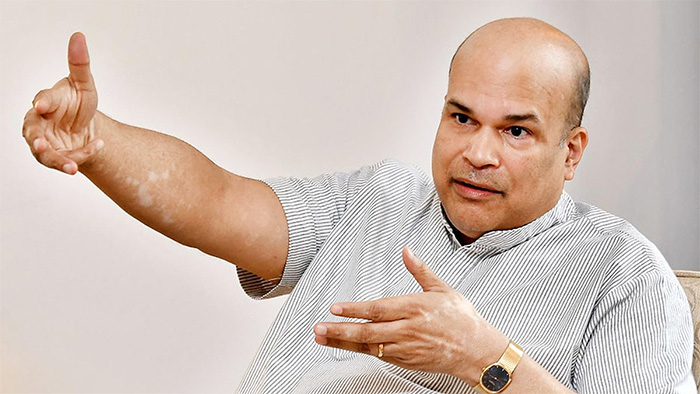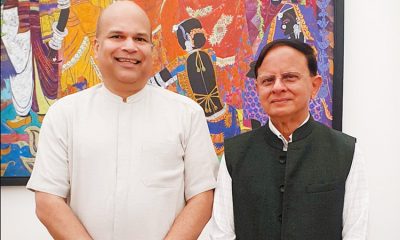News
HC Moragoda pushing for land connectivity with India

Land connectivity is essential for the growth of ties between India and its neighbouring country, Sri Lankan high commissioner to India Milinda Moragoda has said in an interview with The Hindu posted online on July 31, pitching for connectivity projects resembling the “Channel tunnel” from the U.K. to Europe as a possible future initiative if environmental concerns are cleared.
Speaking about Sri Lankan President Ranil Wickremesinghe’s visit to India in July, where the two countries unveiled an “Economic Partnership Vision” statement that includes maritime, air, energy, trade and people-to-people connectivity, High Commissioner Milinda Moragoda said Sri Lanka’s hopes of benefiting from India’s economic growth and coming out of its current economic crisis hinged on being able to build causeways, bridges, pipelines, electricity transmission lines and landing infrastructure so as to increase travel to and from India.
“Building any causeway or highway across the streets will require environmental impact assessments, and there is a process for that”, Mr. Moragoda told The Hindu in an interview. “If Sri Lanka is looking at this idea of piggybacking on India’s growth story we have to have [land] connectivity,” he added.
13th amendment
When asked why concerns expressed by India over implementation of the 13th amendment for devolution of power to Tamil majority areas was not, however, included in the joint statements made during the visit, the Sri Lankan envoy said President Wickremesinghe had discussed his latest proposals with Prime Minister Narendra Modi.
“Prime Minister [Mr. Modi] expressed his views and President [Mr. Wickremesinghe] expressed Sri Lanka’s position. So that conversation will continue,” said Mr. Moragoda, pointing out that eventually the resolution of the Tamils’ issue would have to be found “within Sri Lanka”.
The vision statement released after President Wickremesinghe met Mr. Modi in Delhi on July 21 refers to plans for a feasibility study on land connectivity “at an early date”.
“Both leaders have decided to establish land connectivity between Sri Lanka and India for developing land access to the ports of Trincomalee and Colombo, propelling economic growth and prosperity in both Sri Lanka and India, and further consolidating millennia-old relationship between the two countries,” it said. However, the envoy declined to comment on whether this would involve using the Ram Sethu, or the Adam’s Bridge that connects Tamil Nadu to Mannar Island, which has been the focus of protests by religious and environmental groups, in any way.
Private investments
In addition, the envoy said that as Sri Lanka doesn’t have refining capabilities, an oil pipeline could help the island’s needs, especially if connected to the oil tank farms in Trincomalee which are also part of the MoUs signed during President Wickremesinghe’s visit. The projects agreed to during the visit most closely mirror a number of MoUs signed during Mr. Wickremesinghe’s previous visit in 2017, when he was Prime Minister under then Sri Lankan President Maithripala Sirisena. Those MoUs, including the plan for India to refurbish energy and port facilities in the eastern city of Trincomalee eventually did not make headway and were delayed due to internal political turmoil in Sri Lanka. When asked about timelines for the execution of the projects agreed to during this visit, Mr. Moragoda said the emphasis now is on encouraging private investments.
“When you talk of timelines for initiatives like this in democracies, it’s more complicated. One understanding between the two leaders is to try to encourage the private sector to be more engaged on both sides, which could be more time-sensitive and successful,” he explained. He added that the purpose of the Sri Lankan President’s visit, the first to India since he took over in June 2022, to “chart the way forward” for Sri Lanka’s economic recovery, as the economic vision statement had done, and to thank Mr. Modi and India for the support to Sri Lanka during its debt crisis.
In the past week, Colombo has received visits from French President Emmanuel Macron, Japanese Foreign Minister Yoshimasa Hayashi and an official from the Communist Party of China (CPC) Central Committee, all of whom also offered to help Sri Lanka as it works out a debt restructuring programme with the International Monetary Fund by the end of the year. Mr. Moragoda said economic revenue streams would have to be upgraded for a recovery, and hoped particularly for Indian investment and Indian tourists to contribute to that.
News
US sports envoys to Lanka to champion youth development

The U.S. Embassy in Colombo welcomed the U.S. Sports Envoys to Sri Lanka, former National Basketball Association (NBA) and Women’s National Basketball Association (WNBA) players Stephen Howard and Astou Ndiaye, from June 8 through 14.
The Public Diplomacy section of the U.S. Embassy said that it would launch a weeklong basketball program intended to harness the unifying power of sports, made possible through collaboration with Foundation of Goodness and IImpact Hoop Lab.
While in Sri Lanka, Howard and Ndiaye, both retired professional basketball players, will conduct a weeklong program, Hoops for Hope: Bridging Borders through Basketball. The Sports Envoys will lead basketball clinics and exhibition matches and engage in leadership sessions in Colombo and Southern Province for youth aged 14-18 from Northern, Uva, Eastern and Western Provinces, offering skills and leadership training both on and off the court. The U.S. Envoys will also share their expertise with the Sri Lanka Basketball Federation, national coaches, and players, furthering the development of basketball in the country. Beyond the clinics, they will collaborate with Sri Lankan schoolchildren to take part in a community service project in the Colombo area.
“We are so proud to welcome Stephen and Astou as our Sports Envoys to Sri Lanka, to build on the strong people-to-people connections between the United States and Sri Lanka,” said U.S. Ambassador Julie Chung. “The lessons that will be shared by our Sports Envoys – communication, teamwork, resilience, inclusion, and conflict resolution – are essential for leadership development, community building, equality, and peace. The U.S. Sports Envoy program is a testament to our belief that sports can be a powerful tool in promoting peace and unity.”
News
Rahuman questions sudden cancellation of leave of CEB employees

SJB Colombo District MP Mujibur Rahuman in parliament demanded to know from the government the reasons for CEB suspending the leave of all its employees until further notice from Thursday.
MP Rahuman said that the CEB has got an acting General Manager anew and the latter yesterday morning issued a circular suspending leave of all CEB employees with immediate effect until further notice.
“We demand that Minister Kanchana Wijesekera should explain this to the House. This circular was issued while this debate on the new Electricity Amendment Bill was pending. There are many who oppose this Bill. The Minister must tell parliament the reason for the urge to cancel the leave of CEB employees,” the MP said.However, Speaker Mahinda Yapa Abeywardena prevented Minister Wijesekera responding to the query and said that the matter raised by MP Rahuman was not relevant.
News
CIPM successfully concludes 8th Annual Symposium

The Chartered Institute of Personnel Management (CIPM) successfully concluded the 8th Annual CIPM Symposium, which took place on 31st May 2024. Themed “Nurturing the Human Element—Redefining HRM in a Rapidly Changing World,” the symposium underscored the pivotal role of human resource management (HRM) in today’s dynamic global landscape. Since its inception in 1959, CIPM has been dedicated to advancing the HR profession through education, professional development, and advocacy, solidifying its position as Sri Lanka’s leading professional body for HRM.
Ken Vijayakumar, the President of the CIPM, graced the occasion as the chief guest. The symposium commenced with the welcome address by the Chairperson, Prof. Arosha Adikaram, followed by the Web Launch of the Symposium Proceedings and Abstract Book by the CIPM President. The event featured distinguished addresses, including a speech by Chief Guest Ken Vijayakumar, President of CIPM, and an address by Guest of Honor Shakthi Ranatunga, Chief Operating Officer of MAS Holdings Pvt. Ltd., Sri Lanka.
The symposium also featured an inspiring keynote address by Prof. Mario Fernando, Professor of Management and Director of the Centre for Cross Cultural Management (CCCM) at the University of Wollongong, Australia.
Vote of Thanks of the inauguration session was delivered by Dr. Dillanjani Weeratunga, Symposium Co-chair.
The symposium served as a comprehensive platform for researchers to present their findings across a wide range of critical topics in HRM. These included Cultural Diversity and Inclusion, Talent Development and Retention, Ethical Leadership and Corporate Social Responsibility, Adapting to Technological Advancements, Mental Health and Well-being at Work, Global Workforce Challenges, Employee Empowerment, and Reskilling and Upskilling.
The plenary session was led by Prof. Wasantha Rajapakse. Certificates were awarded to the best paper presenters during the valedictory session, followed by a vote of thanks delivered by Kamani Perera, Manager of Research and Development.
The annual symposium of CIPM was a truly inclusive event, attracting a diverse audience that spanned undergraduates, graduates, working professionals, research scholars and lecturers. This widespread interest highlights the symposium’s significance in the field of HRM, offering a unique opportunity for everyone to network and learn from scholarly brains.The CIPM International Research Symposium was sponsored by Hambantota International Port, Sri Lanka Institute of Information Technology (SLIIT), E B Creasy & Co. PLC, and Print Xcel Company.
















